The Union Budget 2025, presented by Finance Minister Nirmala Sitharaman, lays a strong foundation for India’s long-term economic growth, with a focus on manufacturing, clean mobility, infrastructure development, MSMEs, and middle-class consumption. The budget aims to accelerate ‘Make in India’, expand export capabilities, and drive innovation in clean energy while simplifying taxation and boosting investments in key industries.
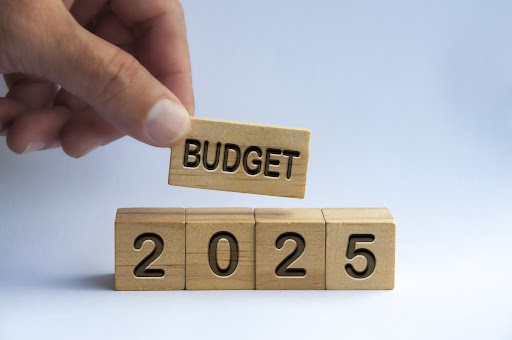
The government’s decision to increase the income tax exemption limit to ₹12 lakh is expected to boost consumer spending, benefiting multiple sectors such as automobiles, logistics, and retail. Further, the National Manufacturing Mission, the Export Promotion Mission, and tax exemptions on critical minerals for EVs and clean tech industries signal India’s commitment to sustainable industrial growth.
Additionally, infrastructure remains a major focus, with ₹11 lakh crore allocated for capital expenditure, alongside continued investments in roads, highways, and logistics networks. This will directly benefit the commercial vehicle and logistics sectors. The budget also brings customs duty exemptions on lithium-ion battery scrap and critical minerals to support the growth of India’s EV ecosystem, alongside new measures to improve the ease of doing business.
Key Takeaways for Various Sectors
1. Automotive Industry & EV Sector
• Increased Disposable Income: The rise in income tax exemption to ₹12 lakh is expected to boost demand for two-wheelers, passenger vehicles, and EVs.
• EV Incentives & Localization: Customs duty exemptions on cobalt, lithium-ion battery scrap, lead, and zinc will lower battery production costs and make EVs more affordable.
• ‘Make in India’ Push for EVs: The National Manufacturing Mission prioritizes local manufacturing of EV batteries, motors, controllers, and high-voltage components.
• Export Growth: BharatTradeNet and the Export Promotion Mission aim to integrate Indian auto manufacturers into global supply chains.
2. Commercial Vehicles & Logistics
• Infrastructure Expansion: ₹11 lakh crore capital expenditure will drive demand for commercial vehicles, especially with ₹2.87 lakh crore allocated for road and highway development.
• Rural Growth Impact: The Dhan Dhanya Krishi Yojana, benefiting 1.7 crore farmers, and expanded Kisan Credit Card loans will support tractor and SCV sales.
• Support for MSMEs & Fleet Operators: Credit guarantee cover for MSMEs doubled from ₹5 crore to ₹10 crore, aiding vehicle financing and fleet expansions.
3. Manufacturing & Auto Components
• Customs Duty Rationalization: The budget removes inverted duty structures, making domestic manufacturing more cost-effective for auto components.
• Boost to MSMEs: Increased credit limits and classification reforms will enhance funding access for micro and small enterprises in the auto component sector.
• Technology Investments: ₹500 crore allocated for a Centre of Excellence in AI, supporting automation and smart manufacturing.
4. Green Energy & Sustainability
• EV Infrastructure Gaps: While there are tax cuts for EV components, the budget lacks clear allocations for charging infrastructure expansion.
• PLI Scheme & Clean Tech Push: Extension of PLI schemes for wind turbines, solar PV cells, and clean energy tech to boost India’s energy transition.
• Grid-Scale Battery Incentives: Investment in grid-scale batteries for renewable energy stability, ensuring that EVs are powered by clean sources.
5. Infrastructure & Construction
• Maritime & Aviation Growth: ₹25,000 crore Maritime Development Fund and expansion of the Tonnage Tax Scheme for inland vessels will improve shipping and port connectivity.
• UDAN 2.0 for Air Cargo & Tourism: 120 new destinations will be connected, boosting air logistics and regional connectivity.
• Road Transport & Highways: Massive investments in roads, bridges, and urban mobility projects to support the growing commercial vehicle sector.
6. MSMEs & Startups
• Credit & Financing Boost: Credit limits for MSMEs have doubled, with a ₹10,000 crore Fund of Funds to aid startups.
• Easier Business Operations: Regulatory simplifications, ease of compliance, and a revamped Central KYC registry will enhance MSME efficiency.
• Skilling & Innovation: Expansion of Atal Tinkering Labs (50,000 new labs) and new incentives for AI-led innovations and deep-tech startups.
Conclusion
Budget 2025 outlines a comprehensive roadmap for India’s industrial growth, with a strong focus on clean mobility, manufacturing, and infrastructure. While the incentives for EVs, MSMEs, and logistics are significant, industry leaders have called for further clarity on climate financing, charging infrastructure, and policy support for battery swapping.
With increased consumer spending, export opportunities, and ease of doing business, the budget provides long-term growth momentum, paving the way for Viksit Bharat 2047.
Let’s take a look at how the auto industry reacted to Budget 2025 and its impact on key sectors.
SIAM – Shailesh Chandra, President

“We welcome this budget which is focused on long term sustained economic growth. The specific focus on rural prosperity and agriculture, coupled with reforms in the Personal Income Tax, is likely to have a positive effect on the Auto Industry, and will help in creating demand.
As the Auto Industry transits into cleaner powertrains, in line with the Hon’ble PM’s vision on sustainable mobility, it will specifically benefit from the National Manufacturing Mission, which supports clean tech manufacturing for batteries, motors and controllers. Furthermore, the exemption of critical minerals (e.g. Cobalt, Lead, Zinc etc.), scraps of Lithium-ion battery, and 35 additional capital goods from customs duty, will help create a strong EV ecosystem in the country.
The Export Promotion Mission and support for integration with global supply chains are critical initiatives that will enable Indian manufacturers to expand export footprints, and align with global supply chains.
The Auto Industry is also thankful to the Government for creating a high-level committee for regulatory reforms, aimed at reviewing regulations, certifications, licenses, and permissions, as this will certainly help in ease of doing business in our sector.”
ACMA Congratulates the Hon’ble Finance Minister on a Forward-Looking Budget 2025-26
The Automotive Component Manufacturers Association of India (ACMA) has applauded the Hon’ble Finance Minister, Smt. Nirmala Sitharaman, for presenting a progressive and growth-oriented Union Budget 2025-26. The budget reflects the government’s strong commitment to strengthening India’s manufacturing sector, fostering innovation, promoting exports and accelerating the transition to clean mobility.
Boosting the Auto Component Industry & MSMEs
The budget’s focus on MSMEs as a key driver of economic growth, with enhanced credit guarantees and revised classification criteria, is a welcome move for the auto component sector. The increase in credit guarantee cover for micro and small enterprises from ₹5 crore to ₹10 crore will encourage investments in technology and R&D, crucial for the industry’s global competitiveness.
Accelerating ‘Make in India’ & Clean Mobility
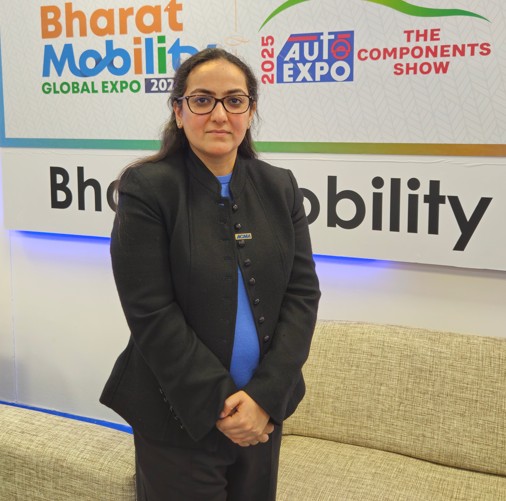
The National Manufacturing Mission and the emphasis on Clean Tech Manufacturing, particularly for EV batteries, motors, controllers, and high-voltage transmission equipment, will provide a much-needed boost to the industry’s localization efforts. ACMA appreciates the government’s initiatives to support the development of a robust EV supply chain and promote sustainable mobility solutions.
Strengthening Supply Chains & Export Competitiveness
The introduction of BharatTradeNet and the Export Promotion Mission will help integrate India’s auto component sector into global supply chains. ACMA welcomes the government’s decision to support MSMEs in overcoming non-tariff trade barriers and facilitate easier access to export credit, enhancing the sector’s global competitiveness.
Customs Duty Rationalization & Taxation Reforms
The industry appreciates the rationalization of customs duties on key raw materials and the reduction of inverted duty structures, which will make domestic manufacturing more cost-effective. The duty exemption on capital goods for EV battery manufacturing is a strong step toward enabling India’s transition to electric mobility.
Speaking on the Budget, Shradha Suri Marwah, President, ACMA, said,
“The Union Budget 2025-26 is forward-looking and growth-centric, reinforcing the government’s commitment to strengthening India’s manufacturing sector and driving the transition to cleaner mobility solutions. The focus on MSMEs, innovation, exports and supply chain resilience will provide a strong impetus to the auto component industry. Further, the proposals for personal Income Tax will put more money in the hands of people thus fuelling consumption leading to economic growth.”
Federation of Automobile Dealers Association (FADA) – C S Vigneshwar, President
“The Union Budget 2025-26 is a well-balanced and growth-oriented budget that prioritizes middle-class spending, rural prosperity, and MSME empowerment. The increase in the income tax exemption limit to ₹12 lakh will directly boost demand for two-wheelers, passenger vehicles, and EVs, as consumers have more disposable income to upgrade their vehicles.

For the rural economy, the Dhan Dhanya Krishi Yojana, benefiting 1.7 crore farmers, along with the Kisan Credit Card loan limit expansion, will drive demand for tractors, small commercial vehicles, and two-wheelers. MSMEs, which form the backbone of the economy, are set to thrive with higher credit limits, enhanced fund-of-funds for startups, and new financing options—a move that will also encourage the expansion of auto dealerships and fleet businesses.
The National Manufacturing Mission and incentives for solar, EV batteries, and clean mobility infrastructure will accelerate the growth of the EV sector while making India a global hub for sustainable mobility. Additionally, the increase in FDI for insurance to 100% will bring more competition and innovative financing options for auto buyers, further stimulating demand.
FADA welcomes this progressive budget, which will fuel India’s auto retail sector across rural, urban, and electric vehicle segments, supporting the vision of ‘Viksit Bharat’ and sustainable mobility.”
National Highways for Electric Vehicles (NHEV) Automobiles & EV Sector – Abhijeet Sinha, Project Director

“Budget 2025-26 introduced tax incentives, including full exemption from Basic Customs Duty (BCD) on key materials like cobalt powder, lithium-ion battery waste and scrap, lead, zinc, and twelve other critical minerals. This decrease in operational expenses will stimulate the expansion of India’s EV battery industry and enhance domestic production capabilities. It’s expected to result in cheaper EV batteries, making electric vehicles more affordable.
Further 35 additional items used in EV battery production and 28 items for mobile phone battery manufacturing have been made duty-free. The reduction in custom & duty complements the existing PLI schemes and will encourage backward integration, enabling Indian manufacturers to scale up operations efficiently.
However, missing Climate Financing outlays and a clear roadmap for expanding charging infrastructure limits the immediate impact on adoption. Funding to finance 25% of the cost of bankable projects upto ₹10 K crore for 2025-26 with ₹1.5 lakh crore additional interest-free loans and Urban Challenge Fund have the potential to support e-mobility initiatives, but a focused green transition fund would have boosted electric mobility differently.
MODINOMICS effects seems working as withing a 3 year timeframe from its launch PM Gati Shakti National Masterplan (2021) unfolded dynamic wings in Budget2025 with potential DATA offerings to private sector to integrate and develop top 50 tourist destinations with multimodal logistic and connectivity in partnership with state govt, hotels, mobility and logistic players.
Electric Mobility need to achieve faster adoption that warrants immediate action is needed in the form of stronger incentives for fleet electrification and a rapid expansion of charging networks. The industry expected beyond PM E-Drive from budget to a proactive measure to position India as a competitive global player in the EV market. Recent guidelines on charging infrastructure and battery swapping could have taken mission mode with increase investor confidence and accelerate the transition to EVs.”
Tata Motors – Girish Wagh, Executive Director

“The Union Budget 2025 lays out a clear roadmap for long-term transformation, driving India closer to its vision of a ‘Viksit Bharat’ with progressive policies and reforms that foster modernization, economic growth, and inclusive development. The continued allocation of over Rs. 11 lakh crore in capital expenditure, alongside targeted initiatives to boost consumption, support ‘Make in India’, and promote agricultural growth, is set to create a more dynamic economic environment. The removal of basic customs duties on key materials for battery manufacturing is a strategic move to boost domestic EV production, foster a sustainable ecosystem, and drive India’s transition to a greener economy. As infrastructure projects gain momentum and consumption picks up, improved roads, connectivity, and logistics will undoubtedly drive increased demand for freight and commercial transport solutions driven by both domestic demand and broader economic recovery.”
Ashok Leyland – Dheeraj Hinduja, Executive Chairman

“The Finance Minister has presented a clear, growth-driven budget that aligns with the Prime Minister’s vision of fostering a competitive and resilient India with inclusive growth by investing in people, economy and innovation. The budget prioritizes extensive national infrastructure development and accelerates the digitization of the economy. Continuous government investments in infrastructure are set to fuel sustained economic growth. Additionally, the government’s strong commitment to green mobility is expected to create new avenues for innovation and growth across the country. The launch of the National Manufacturing Mission will support the sector by providing crucial policy backing, execution plans, and a governance and monitoring framework. With strategic investments in skilling, digitization, healthcare, education, agriculture, and electrification, the budget aims to shape India’s economic trajectory in the years ahead. Furthermore, it reinforces our commitment to clean energy vehicles, contributing to a greener, cleaner future as part of the national mission to achieve net-zero carbon emissions.”
VECV – Vinod Aggarwal, MD & CEO

“We congratulate the government on presenting a forward-looking and growth-oriented Union Budget 2025–26. The budget reaffirms the government’s strong commitment to strengthening India’s manufacturing sector and accelerating the transition to clean and sustainable mobility while bolstering India’s economic resilience.
The introduction of the National Manufacturing Mission and the emphasis on Clean Tech Manufacturing, including National Critical Minerals Mission, particularly for EV batteries, motors, controllers, and high-voltage transmission equipment, will provide a significant boost to ‘Make in India’ efforts. The rationalization of custom duties on key raw materials and the reduction of inverted duty structures will also enhance cost-effectiveness in domestic manufacturing. The duty exemption on capital goods for EV battery manufacturing is a welcome step toward accelerating India’s electric mobility transition.
Furthermore, adjustments in GST rates, incentives for electric vehicle adoption and import duties on components will reshape the industry’s landscape. Increased allocations for infrastructure development, particularly in roads and transportation, will directly fuel demand for commercial vehicles. Additionally, budgetary provisions for working capital support, technology upgradation funds, and easier credit access will play a crucial role in strengthening the MSME ecosystem, ensuring its long-term growth and sustainability.
At VECV, we remain committed to advancing sustainable mobility solutions and contributing to India’s vision of a self-reliant, cleaner, and more efficient transportation ecosystem. The budget outlines a plan for promoting sustainable transportation through integrated infrastructure development initiative. Overall, the Union Budget 2025 reflects a comprehensive approach to stimulate inclusive economic growth through targeted investments in critical sectors that are essential for India’s development trajectory.”
CJ Darcl Logistics – KK Agarwal, Chairman & MD

“We commend the budget for its focus on strengthening the shipping sector with ₹25,000 crore Maritime Development Fund along with the Tonnage Tax Scheme’s expansion to inland vessels that will together enhance port connectivity and streamline maritime operations. The government’s plan to set up a digital public infrastructure ‘BharatTradeNet’ (BTN) for ease of documentation in international trade, domestic manufacturing capacities to integrate the Indian economy with the global supply chain and help private sector with data and maps from PM Gati Shakti’s insights are admirable initiatives that will boost domestic as well as international trade. Furthermore, the budget’s focus on improving air cargo infrastructure and the launch of ‘Udaan 2.0’, connecting 120 new destinations is a welcoming move for the logistics sector. Overall, this budget is a strong step towards the broader vision of ‘Viksit Bharat’ by 2047. We, at CJ Darcl, are looking forward to the opportunities these projects present and are dedicated to support the government in developing a robust, sustainable, and globally competitive logistics ecosystem.”
Satyakam Arya, MD & CEO, Daimler India Commercial Vehicles –
“The Union Budget 2025-26 will be a game changer for India and the mobility sector in particular, helping us become a global leader in EV manufacturing and sustainable transportation.

The decision to fully exempt 35 capital goods essential for EV battery manufacturing from Basic Customs Duty (BCD), along with complete tax exemptions on critical materials such as Lithium and Cobalt, will dramatically reduce production costs and foster a more robust local supply chain. This emphasis on localising battery production will create technological advancements and generate more jobs. Together with the new income tax slabs, we expect higher disposable incomes and more discretionary spending power – two factors that will positively impact the overall economy.
Also, with Mining identified as one of the six domain areas for transformative reforms and the introduction of the State Mining Index, we see major growth potential for the sector in the coming years. The allocation under the National Critical Minerals Mission will also enhance domestic production, technology development and create a skilled workforce.
Given DICV’s strong commitment to sustainability, we particularly welcome and appreciate the Government’s forward-thinking vision.”
SWITCH Mobility – Mahesh Babu, CEO

“India’s FY25-26 budget targets economic growth with a 4.4% fiscal deficit and income tax cuts, including exemptions for individuals earning up to ₹12 lakh boost disposable income, consumer spending benefiting sectors like commercial vehicles with higher logistics demands. The budget also simplifies duties and taxes to support MSMEs, startups, and entrepreneurship.”
The exemption of customs duties on lithium-ion batteries and critical minerals such as cobalt, zinc, and lead represents a crucial step in reinforcing India’s electric vehicle (EV) ecosystem. This move will enhance the competitiveness of the EV industry, helping it to grow more rapidly and become a key player in the global market. It accelerates India’s progress toward Aatmanirbharta in clean energy and sustainable mobility solutions. These measures are expected to reduce the overall cost of EVs, making them more affordable for consumers, which directly supports the government’s ambitious target of achieving 30% EV adoption by 2030.”
ZF Group – Akash Passey, President, ZF Group in India

“The 2025-26 Union Budget, presented today, sets the stage for an inclusive growth trajectory, paving the way for a robust and fast developing India. It strikes the right balance between increasing consumption and increasing competitiveness.
For me most importantly, the budget focuses on upping the index of ‘Ease of Doing Business’, with regulatory reforms, good governance and incentivization of investments. By prioritizing the ‘Ease of doing Business’, technology access, and MSME growth, this initiative will drive industrial competitiveness across sectors, including the auto components industry.
The National Manufacturing Mission is a critical step towards advancement of the ‘Make in India’ vision. The strengthening of domestic manufacturing, and fostering a future-ready, upskilled workforce all contribute significantly towards this goal. As a global leader in mobility technology, ZF Group in India is pleased to see that our commitment to delivering advanced safety, electrification, and efficiency solutions for passenger cars and commercial vehicles is closely aligned with this mission.
The Government’s focus on Clean Tech manufacturing is particularly decisive for the nation’s transition towards sustainable mobility. Strengthening domestic capabilities in EV batteries, motors, controllers, wind turbines, and high-voltage transmission equipment will enhance local value addition and build a robust supply chain for sustainable energy and next-generation vehicles. At ZF Group in India, we remain committed to partnering with industry stakeholders to continue to drive innovation, scale up localization, and contribute to India’s clean future mobility.”
Varuna Group – Vivek Juneja, Founder & Managing Director

“The government’s push for private sector integration into PM Gati Shakti marks a significant turning point for the logistics industry. The availability of real-time infrastructure data will greatly enhance route planning, reduce transit times, and streamline freight movement. With an increased focus on public-private partnerships in road corridors and logistics parks, this aligns perfectly with the long-term expansion strategy for warehousing and multimodal transportation. Additionally, the interest-free loans for state-led projects will enhance last-mile connectivity, ensuring faster and more reliable deliveries for businesses dependent on road freight. The ₹10 lakh crore asset monetisation plan also presents a valuable opportunity to scale warehousing infrastructure and optimise freight networks across India.
The introduction of BharatTradeNet (BTN) is another step forward in our commitment to digital transformation in logistics. By simplifying real-time data exchange, trade documentation, and financing solutions, BTN will drive greater efficiency and reduce operational inefficiencies, especially for companies involved in export logistics. As we expand our digital capabilities, this initiative will enhance visibility, transparency, and trade facilitation for our clients.
The customs reforms, including faster clearance processes and a more predictable framework for import-export operations, will significantly benefit logistics providers. These reforms, coupled with the voluntary compliance framework, will create a more efficient and business-friendly regulatory environment, enabling smoother operations for businesses in trade logistics.
Altogether, the Union Budget’s focus on infrastructure, digital transformation, and customs reforms underscores the government’s commitment to strengthening India’s logistics ecosystem. These reforms present invaluable opportunities for industry players to optimise supply chains, improve road freight efficiency, and enhance warehousing solutions. At Varuna Group, we are excited to leverage these developments to drive sustained growth, innovation, and a digitally integrated, globally competitive logistics network.”
Association of Indian Forging Industry (AIFI) – Yash Munot, President

“The Union Budget 2025-26 showcases the government’s continued focus on revitalizing the manufacturing sector, particularly the MSME and automotive industries, which are crucial to India’s forging sector. The announcement to double the credit guarantee cover for micro and small enterprises and the introduction of customized credit cards for micro enterprises will enhance financial access, fostering growth and innovation. Additionally, the enhanced investment and turnover limits for MSME classification are expected to boost operational scalability, helping forging companies remain competitive in global markets. Additionally, the Budget has also helped the salaried class and middle class with the NIL Income Tax limit raised to Rs 12 lacs.
The increased emphasis on clean technology manufacturing and the government’s commitment to sustainable development provide promising opportunities for the forging sector to invest in advanced and environmentally friendly technologies. With policies supporting research and development, skill development, and clean energy, the forging industry stands poised to play a pivotal role in driving the growth of India’s manufacturing sector while supporting the nation’s aspirations for Viksit Bharat by 2047.”
Renault India – Venkatram Mamillapalle, Country CEO & MD
“We welcome the transformative vision of Finance Minister Nirmala Sitharaman in the Union Budget 2025. The budget’s focus on agriculture, MSME development, investment, and exports sets a promising path for India’s growth.
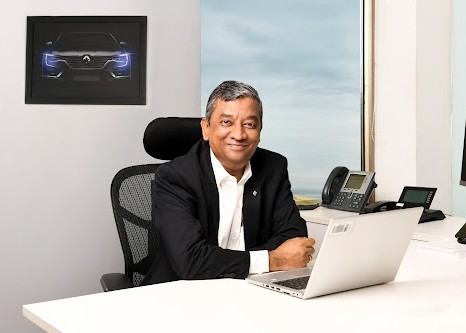
We commend the Dhan-Dhaanya Krishi Yojana, benefiting 1.7 crore farmers, and the revised tax structure exempting income up to ₹12 lakh, which will boost consumer spending. This is expected to positively impact vehicle purchases, especially among the growing middle class.
The National Manufacturing Mission strengthens ‘Make in India’ with robust policy support and execution roadmaps. By prioritising rural development, tax reforms, and clean-tech manufacturing, the budget lays a strong foundation for a greener, more prosperous future. Renault India is ready to engage and contribute to a sustainable India.”
EKA Mobility – Dr. Sudhir Mehta, Founder & Chairman

“We commend the government’s forward-thinking budget, which emphasizes sustainability, innovation, and domestic industrial growth. The Union Budget 2025 announcements underline the commitment to creating an environment that fosters economic growth while addressing major issues in the clean energy and mobility sectors. The Finance Minister’s initiatives, including the National Manufacturing Mission and strategic exemptions on critical minerals for EV battery production, are crucial steps toward strengthening the cleantech ecosystem. Importantly, the budget exempts 12 more minerals, cobalt powder, lead, zinc, lithium-ion battery trash, and other essential inputs from Basic Customs Duty (BCD). There has also been a noticeable increase in the manufacturing of 35 new EV capital products. These programs demonstrate a strong commitment to sustainability, innovation, and greater industrial competitiveness, setting the framework for transformative progress in a variety of critical sectors. The nation’s energy revolution will be dependent on funding for small modular reactors and the government’s target of 100 gigawatts of nuclear power by 2047. Long-term growth can be solidified by financial agreements that allow governments to expand their borrowing capacity, as well as indirect taxation initiatives targeted at increasing domestic value creation. The Budget 2025 accelerates the transition to a more sustainable and environmentally conscious future.”
GreenCell Mobility – Devndra Chawla, CEO & MD

“GreenCell Mobility applauds the Government of India for its steadfast commitment to advancing the EV sector and fostering a sustainable future. The set up of National Manufacturing Mission and exemption on capital goods will accelerate domestic clean tech manufacturing, enhance EV battery production, and strengthen India’s renewable energy ecosystem. A robust EV infrastructure is crucial for industry growth and seamless integration of electric mass mobility. Additionally, the government’s focus on connectivity and tourism infrastructure, along with income tax relief, will boost economic activity by increasing disposable income for the middle class. These initiatives will encourage more people to explore new destinations while choosing sustainable and eco-friendly transportation options like our NueGo service. At GreenCell Mobility, we remain committed to supporting India’s sustainable development goals by driving the future of electric mass mobility and contributing to a greener, more connected nation.”
JK Tyre & Industries – Raghupati Singhania, Chairman & MD
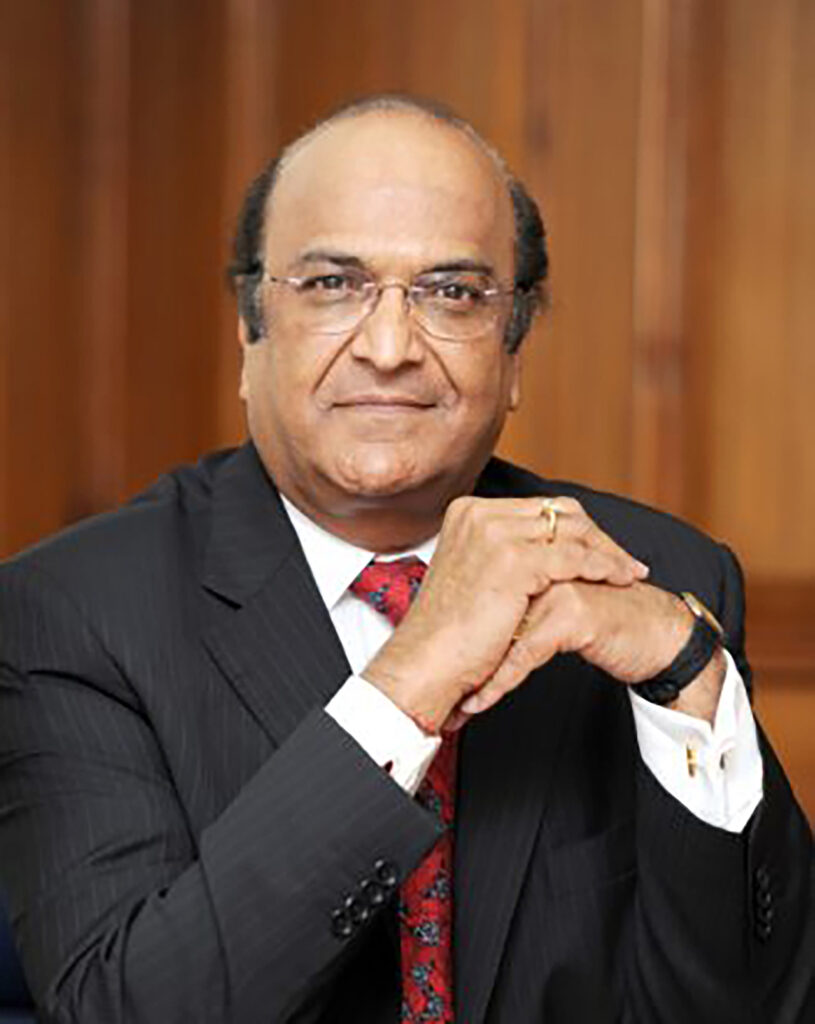
“The Union Budget 2025-26 lays a strong foundation for India’s continued economic resilience and manufacturing excellence. Thrust on green energy transition, manufacturing and ease of doing business will propel the automotive and tyre industries forward. Emphasis on clean tech manufacturing, with incentives for EV components and advanced mobility solutions, aligns well with automotive sector’s vision for sustainability. Additionally, the measures to strengthen global supply chain integration and streamline trade regulations will bolster India’s global manufacturing competitiveness. We look forward to leveraging these opportunities to drive innovation and sustainable growth.”
Kinetic Green – Sulajja Firodia Motwani, Founder & CEO

“We welcome this progressive budget, which paves way for robust economic growth through its strong emphasis on agricultural reforms, support to MSMEs, and capital expenditure. The increase in the income tax exemption limit is a significant step that will enhance consumption and drive demand.
In particular, the focus on the EV sector is commendable and most welcome. The exemption of Basic Customs Duty (BCD) on critical minerals like cobalt, lead, and lithium scrap will streamline the EV battery and cell supply chain, reducing costs and boosting efficiency. Additionally, the exemption on BCD for capital goods used in lithium-ion battery manufacturing is a welcome move to strengthen domestic battery production.
Further, the promotion of ‘Make in India’ for key EV components such as controllers and motors, alongside incentives for solar PV cell manufacturing, will accelerate India’s transition towards clean mobility and sustainable energy solutions.
Overall, this is a well-balanced budget that aligns with our vision of a green and self-reliant India.”
Bharat Forge, Baba Kalyani, Chairman & MD
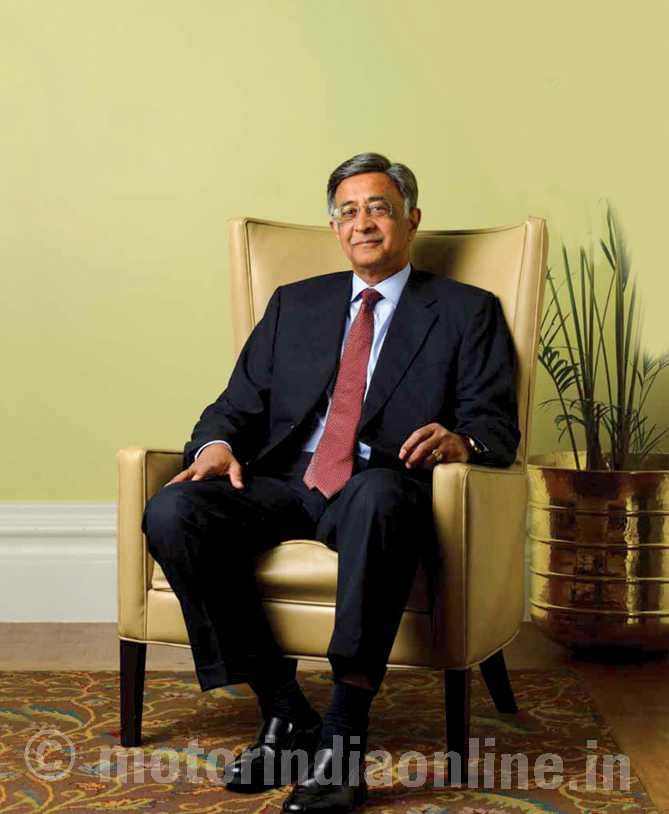
“The budget presents a strong focus on the inherent strengths of Indian economy and key economic drivers of Viksit Bharat 2047. The 3M’s that bring me cheer are – Middle Class, MSMEs and Make in India! 1) Big boost to salaried middle-class will accelerate economic growth; 2) Revised Classification and Exports push to help Indian MSMEs go global! 3) Focussed attention to ‘Make in India’ in HiTech and labour intensive industries will attract investments.
I also welcome the launch of the Manufacturing Mission, the Exports Promotion Mission and the Nuclear Energy Mission. Initiatives such as Cancer Care Centers in every district across the country will further modernize the Healthcare and Medical Infrastructure across the country.
Special development measures to boost agriculture productivity, self-reliance in pulses and leveraging ‘India Post’ to deliver financial services are expected to drive Rural Growth.
What is noteworthy is a special mention of revamping Bilateral Investment Treaty Model – a sign of following an India First model amidst heightened global volatility.
Hallmark of successive governments under the leadership of Hon’ble Prime Minister has been continued thrust on ease of doing business, fiscal prudence and investment led growth.
The Budget continues to deliver on these three levers, and I am confident that these initiatives collectively signal a robust blueprint for India’s progressive and inclusive development.”
Ultraviolette Automotive – Narayan Subramaniam, CEO & Head of Design

“We are enthused to see the Union Budget 2025-26 prioritizing clean technology and domestic manufacturing, especially in the electric vehicle sector. Increased infrastructure investment and incentives for electric mobility will strengthen our efforts to develop eco-friendly mobility solutions. The inclusion of 35 capital goods for EV battery manufacturing in the exemption list is a transformative move, significantly reducing production costs and fostering innovation in lithium-ion battery production. Furthermore, the full exemption on critical minerals like cobalt powder and lithium-ion battery scrap ensures a steady supply of essential resources, thereby boosting local production and job creation in the clean tech sector. As an electric vehicle manufacturer, we are particularly encouraged by the budget’s focus on enhancing the domestic production of key components such as batteries, motors, and controllers. This initiative will not only strengthen India’s EV ecosystem but also enable us to build a more resilient local supply chain. This budget not only empowers the aspiring MSMEs financially but also encourages the adoption of cleaner alternatives, paving the way for a greener future.”
Budget to re-energize economy by lifting sentiments of the middle class and nudging private sector to invest: FICCI
Commenting on the Union Budget 2025-26 proposals, Mr Harsha Vardhan Agarwal, President, FICCI said, “Through the Budget the government has made a strong effort to address the immediate challenges being faced by the economy, particularly on the consumption front, while keeping an eye on the long-term target of pursuing the vision of ‘Viksit Bharat’. FICCI would like to compliment the Finance Minister for a comprehensive, inclusive and forward-looking budget that encompasses a heavy dose of reforms, fiscal stimulus and a clear focus on the farm sector, MSMEs, youth and women of the country.”
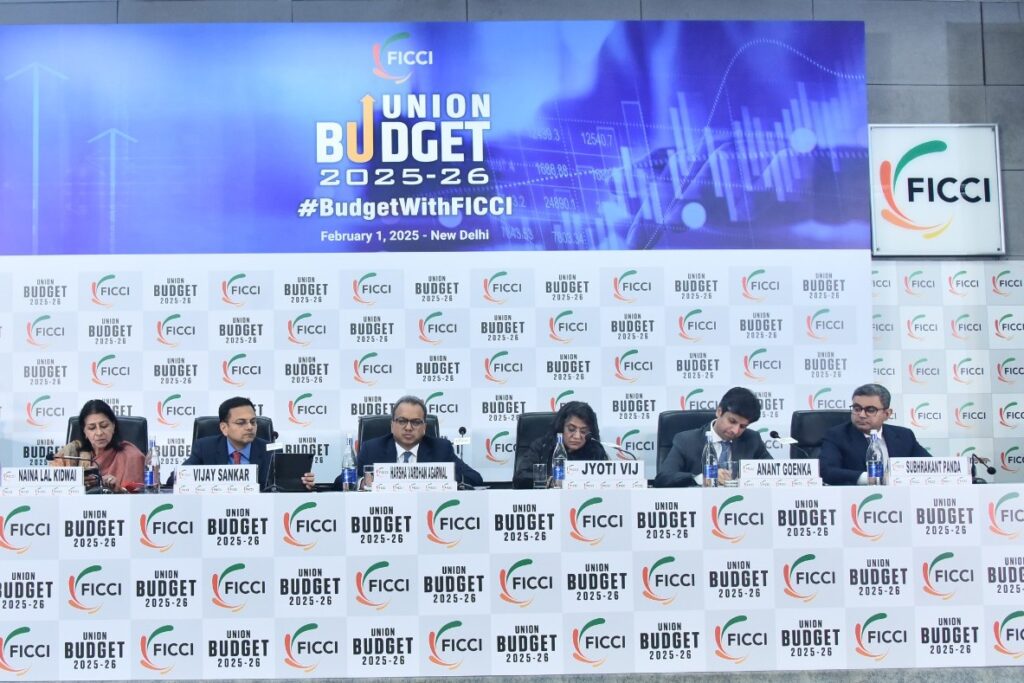
“The Budget proposals will re-energise the economy by lifting the sentiments of the middle class and nudging the private sector to advance its investment plans as demand improves across sectors,” he added.
The Budget was presented at a time when the economy was seeing a slowdown in growth and FICCI had requested the government to consider taking steps that would spur both consumption and investment demand. The changes brought about in the personal income tax structure are noteworthy and will leave more money in the hands of the people translating into higher consumption demand. Likewise, while the increase in the capital expenditure of the government may seem modest compared to the previous years, it is still a good sign.
The agriculture sector once again saw a huge thrust being placed on it with the government announcing a focused program that would cover 100 districts with low productivity, moderate crop intensity and below-average credit parameters. FICCI had requested in its pre-budget submission that an agricultural yields mission for bottom 100 districts similar to aspirational districts programme must be considered by the government and we are happy to note that this suggestion has been taken up in the budget. Additionally, the announcement pertaining to launch of a National Mission on High Yielding Seeds will aid the country’s efforts to mitigate the impact of climate change on the farm sector. Further, the six-year mission focusing on improving yields of pulses will help us address the inflationary pressures seen in this important category of food, which is a primary source of protein for many Indians. The private sector of the country stands ready to partner the government in both these missions and support the same in all possible manner.
The MSME sector of the country also came in for a special mention in the budget. The twin measures of revision of the classification criteria for MSMEs as well as doubling the credit limits with guarantee cover will have a far-reaching effect on the growth of this vital sector that forms the backbone of our economy. Further, the specific measures announced for labour intensive sectors such as footwear, leather, food processing and toys – all of which are dominated by MSMEs – will give a leg up to employment especially in the tier 2 and tier 3 towns and cities of the country.
On the infrastructure side, we saw the budget focus on maritime sector through a new Maritime Development Fund that was announced. This will give a boost to marine economy, especially in the coastal states of the country, creating growth opportunities for both trade and the blue economy related segments. FICCI has also noted with interest the plan to connect 120 new destinations under the UDAN scheme as this too will enable new economic opportunities spurring the newly connected regions of the country as emerging growth centres.
To supplement the efforts towards Make in India for the World, the budget also saw inclusion of a series of measures targeting promotion of exports. Most notable amongst these is the launch of a new digital public infrastructure – Bharat Trade Net – that would be a unified platform for trade documentation and financing solutions for our merchant and merchandise exporters. Our government is increasingly using India’s technical and digital capabilities in new spheres for enhancing the ease of doing business. FICCI hopes that through this new DPI, the various touch points for exporters will be unified enabling seamless exchange of information. This would improve efficiency in the exports process and bring down the cost and time of doing business.
The budget also contained many measures to improve the skilling ecosystem in the country so that our youth get trained on the new emerging technologies that are seeing a rise in demand in the industry. In this context the decisions taken to expand capacity in the country’s premier technical instititution – IITs, expand number of seats under medical education, setting up of 50,000 Atal Tinkering Labs and a new Centre of Excellence for imparting education in AI are indeed commendable. These steps would strengthen India’s credentials as a source of skilled manpower in the world that can cater to demand both at home and abroad.
In addition to the above announcements, FICCI also welcomes initiatives pertaining to introduction of a revamped Central KYC registry, introduction of a new Income Tax Bill, introduction of Jan Vishwas Bill 2.0, further measures for regulatory reforms and reduction in the number of applicable customs tariff rates. All these are geared towards promoting ease of doing business in the country and underline government’s continuous endeavours towards the adage ‘Minimum Government, Maximum Governance’.
Sona Comstar – Sunjay J Kapur, Chairman (Deputy Chairman, CII Northern Region)

“The Union Budget 2025 lays a strong foundation for sustainable urban growth, infrastructure modernisation and a thriving investment climate. The National Manufacturing Mission under Make in India will create a robust framework for industries across solar PV, electrolysers, and grid-scale batteries. The expanded ₹10,000 crore Fund of Funds will provide a vital boost to startups, driving innovation and entrepreneurship. The ₹1 lakh crore Urban Challenge Fund and enhanced infrastructure support will catalyse economic activity and improve liveability in cities. Initiatives like Atal Tinkering Labs, National Centres of Excellence, and IIT expansion will equip India’s youth with future-ready skills.
Exemptions on basic customs duty for EV components and critical minerals, along with a model Bilateral Investment Treaty, reinforce India’s commitment to self-reliance and global competitiveness. Overall, this budget marks a decisive step towards positioning India as a global powerhouse in manufacturing, mobility, and clean technology.”
CASE Construction Equipment – Shalabh Chaturvedi, MD, CASE Construction Equipment – India & SAARC

“The Union Budget reflects a strong commitment to inclusive and sustainable growth, covering key areas such as infrastructure development, green energy, taxation reforms, and social welfare. The substantial increase in funding for key infrastructure projects, NIP extension, bridging the rural-urban divide, and enhanced allocations urban infrastructure set the stage for new opportunities in Construction Equipment Industry. The ₹2.87 lakh crore allocation for road transport and highways is a significant investment that aligns with our mission to support and strengthen India’s infrastructure growth.
Furthermore, the emphasis on National Centers of Excellence for Skilling and vocational training is a welcome move, ensuring that India is future-ready by integrating innovation, technology, and workforce development. With initiatives like the National Manufacturing Mission, 50,000 Atal Tinkering Labs, and Centres of Excellence in AI, the government is fostering a robust ecosystem that promotes growth, upskilling, and employment generation. We are excited to be part of this transformative journey and contribute to India’s economic and industrial progress.”
CASE Construction Equipment – Puneet Vidyarthi, Head of Brand Marketing, CASE Construction Equipment – APAC & President, Rural Marketing Association of India
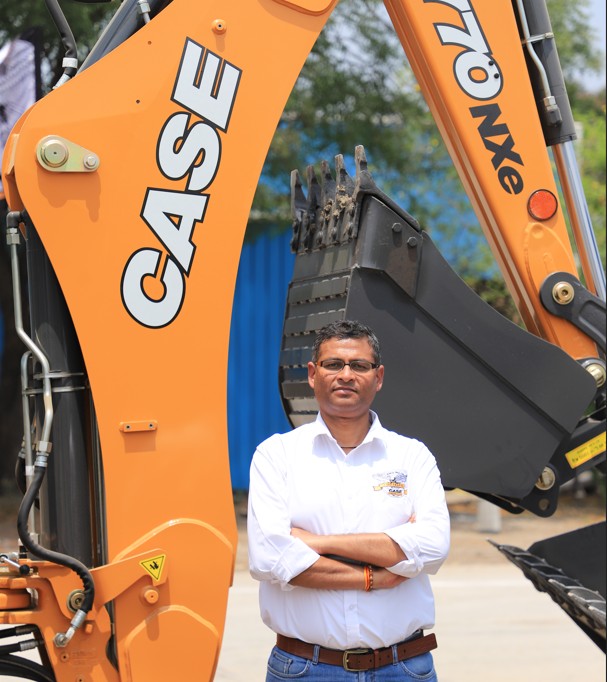
“The Union Budget places a strong emphasis on agricultural growth and rural prosperity, reinforcing the foundation of ‘Bharat.’ The modified UDAN scheme, aimed at connecting 120 new destinations across India, is a game-changer, paving the way for progress by enabling better connectivity, fostering reverse migration, and generating employment opportunities in Tier 2 and Tier 3 cities.
Additionally, allowing states an additional borrowing limit of 0.5% of GSDP opens the door for more regional-level reforms and development. The budget strikes a unique balance between urban and rural growth, green initiatives, infrastructure expansion, innovation, and social welfare. In essence, this budget empowers rural India, ensuring inclusive and sustainable progress for the nation.”
SUN Mobility, Chetan Maini, Co-Founder & Chairman
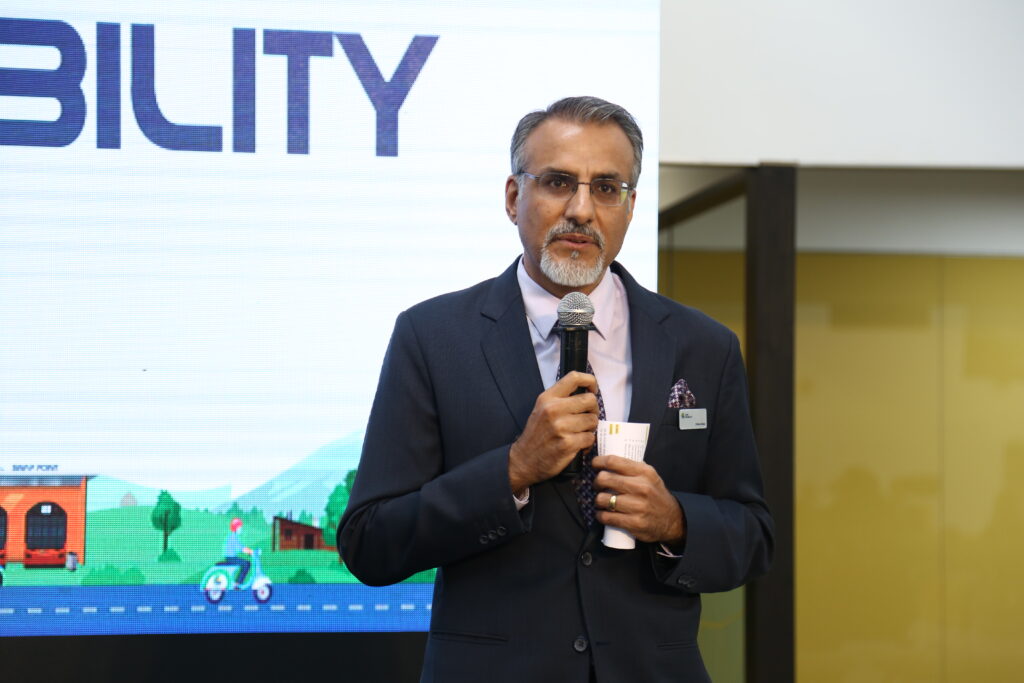
“The proposed tax reforms aimed at the middle class are commendable as they are expected to drive demand in both essential and aspirational fast-moving consumer goods sectors. The introduction of the “National Manufacturing Mission” is a welcome move designed to encourage small, medium, and large manufacturers, thereby promoting Make in India. This initiative can potentially position India as a global hub for clean technology manufacturing.
The exemption of customs duty on capital goods for EV battery manufacturing, along with the INR 20,000 crore allocation for private sector-driven R&D, will undoubtedly spur innovation in battery and clean technologies. As India starts to manufacture EV batteries, the proposed reduction in import duties for critical minerals will help reduce costs.
While this budget aligns with India’s broader vision for progress and positive steps on promoting clean technologies, there remains an urgent need to rationalize the GST disparity between EVs and batteries that the EV industry needs. In addition, policies to enable a level playing field for battery swapping and fixed-battery electric vehicles can further accelerate investments and adoption of electrical mobility in the country.
At SUN Mobility, we remain dedicated to our mission and will continue advocating for supportive policies that promote sustainable transportation.”
TVS Motor Company, Sudarshan Venu, Managing Director

“The new tax slabs put more money in the hands of the middle class, boosting both disposable income and consumption, further strengthening the economy. Add to that the government’s push for higher agricultural productivity and stronger MSMEs, and we have the perfect recipe for accelerated economic growth.”
Toyota Kirloskar Motor – Vikram Gulati, Country Head and Executive VP – Corporate Affairs and Governance

“Toyota Kirloskar Motor commends the Union Budget 2025-26 for its focus on reforms, infrastructure development, reinforcing fiscal discipline, rationalising taxation, and fostering domestic manufacturing – all aimed at driving holistic development.
The increased allocation for capital expenditure demonstrates the government’s persistent commitment towards infrastructure modernisation, a crucial factor in accelerating growth across industries and improving their competitiveness including automotive sector.
Lowering of taxation through Income Tax measures and the PM Dhan Dhanya Krishi Yojana for the farming community will significantly benefit the common man, enhance consumption and create demand leading to faster economic growth.
Continued and strong support to MSMEs, with special focus on labour-intensive sectors and first-time entrepreneurs will spur innovation and growth, aligning well with India’s ambition of becoming a manufacturing major.
Further, the inclusion of 35 additional capital goods for EV battery manufacturing is an important step towards localizing lithium-ion battery production which will help in lowering import dependency, and further strengthening India’s energy security goals. This will not only accelerate clean technology adoption but also create a robust supply chain supporting India’s Carbon Neutrality goals for 2070.
At Toyota Kirloskar Motor, we stand firmly with the government’s vision of a self-reliant, sustainable, and globally competitive automotive industry. Our unwavering commitment to advancing clean energy technologies, deepening investments in local manufacturing, skilling and contributing to India’s ‘Viksit Bharat’ vision reflects our dedication to driving economic growth while upholding environmental responsibility.”
Castrol India Limited – Kedar Lele, Managing Director

“In the Union Budget 2025-26 presented by Union Finance Minister Nirmala Sitharaman on February 1, we commend the government’s 10-point agenda aimed at fostering transformative reforms. These measures focus on ensuring an inclusive growth trajectory and driving employment-led development, aligning with the broader vision of ‘Viksit Bharat’ for the nation’s progress and development.
The National Manufacturing Mission, outlined in the Union Budget 2025-26, is a key step in strengthening India’s clean tech manufacturing ecosystem. By offering tax exemptions on lithium battery production and 35 additional raw materials, the government aims to boost domestic EV battery manufacturing, reducing costs and driving demand for electric vehicles. This presents a valuable opportunity for us to expand our cutting-edge EV portfolio of EV fluids, coolants, transmission fluids, and greases, under Castrol ON. To further accelerate EV growth, we are enhancing R&D initiatives, advancing next-gen EV products and focusing on strengthening OEM partnerships.
Our commitment to a future-ready workforce for the EV segment, aligns well with government agenda for skill development. We have trained over 1,000 mechanics through our EV Readiness Program and upskilled auto mechanics, nationwide.
With tax exemptions making income upto INR 12 lakhs tax free is expected to increase consumption and boost market demand across sectors, including mobility sector and ancillaries like lubricants.”
Setco Auto Systems – Udit Sheth, Vice Chairman

“The Union Budget is robust and with the interventions within it will spur multifaceted growth and consumption. Overall this will positively impact our economy, drive logistics and transport activities that will in turn benefit our MHCV sector. Exciting days ahead!”
Tata Technologies – Warren Harris, CEO & MD
“The budget’s focus on establishing a National Manufacturing Mission aligns with our goal of engineering in India for ‘Make in India’ and enhancing the nation’s self-reliance in manufacturing. This initiative is poised to attract investments and improve efficiency, positioning Indian companies as globally competitive players.

The establishment of five National Centres of Excellence for Skilling is a pivotal move in building a future-ready workforce. This initiative resonates with our commitment to engineering a better future for India’s youth through investment in in-demand training programs across Industry 4.0, IoT, and advanced manufacturing, and collaborating with state governments to upgrade ITIs into technology hubs.
Additionally, the allocation of ₹500 crore for a Centre of Excellence in Artificial Intelligence for education underscores the importance of fostering innovation and research in AI, which will benefit both the education sector and the broader technology landscape.”
Odysse Electric – Nemin Vora, Founder
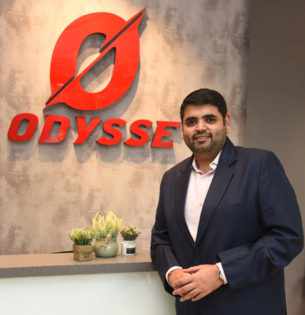
“We appreciate the Union Budget 2025, which underscores the government’s commitment to fostering economic growth and empowering citizens. The adoption of progressive policies, particularly within the existing tax framework, is a key step in enhancing disposable income and driving consumer spending. This decision will significantly impact consumer-driven sectors, especially the two-wheeler industry. With more disposable income in the hands of consumers—particularly the middle class—purchasing power is set to rise. As a result, more individuals will be encouraged to invest in personal mobility solutions like two-wheelers. Given the industry’s crucial role in providing affordable and efficient transportation, this shift could drive substantial growth. As consumer confidence strengthens and spending increases, demand for two-wheelers is expected to surge, further accelerating industry expansion.”
Routematic – Sriram Kannan, Co-Founder & CEO

“The Union Budget 2025-26 underscores a strong commitment to innovation-driven economic growth, with its focus on urban infrastructure, clean tech, AI-powered solutions, and sustainable mobility. Investments in digital infrastructure, AI-driven innovation, and Public-Private Partnerships (PPP) for transportation will be crucial in advancing urban mobility solutions. The National Framework for GCCs will further boost corporate investments, increasing demand for seamless employee transportation services. Enhanced credit support for MSMEs, extended tax benefits for startups and a sharper focus on domestic EV component manufacturing, including batteries and controllers, will accelerate electric mobility adoption. At Routematic, we welcome these measures as they align with our vision of building sustainable, tech-driven mobility solutions while easing urban congestion.”
Routematic – Kavitha Ramachandra, Co-Founder & Executive Director

“The Union Budget 2025-26 is a significant step towards empowering women entrepreneurs and fostering inclusive economic growth. The ₹10,000 crore fund for startups, the new term loan scheme benefiting 5 lakh women from SC/ST communities, and the introduction of customized credit cards for micro enterprises will help bridge the financial gap that often holds women-led businesses back. Access to capital and financial tools tailored for small businesses will enable more women to launch, sustain, and scale their ventures.”
Fleetguard Filters – Niranjan Kirloskar, Managing Director
“The Union Budget presented today, demonstrates our government’s will to boost India’s manufacturing sector. Introducing a ‘National Manufacturing Mission,’ with an 89% increased allocation to ₹16,092 crore, highlights our government’s dedication to improving domestic production capabilities. Extending PLI schemes to various sectors is a good strategic move to diversify and strengthen local manufacturing. The much-needed tax reforms, like higher exemptions and simplifying tax slabs, will improve consumer sentiment and spending, invariably stimulating demand for various manufactured goods.

Additionally, the announcement to set-up a centre for AI, and readying talent for Industry 4.0 will provide a much-needed impetus to all industries enabling crucial job-creation and for us to ‘Make in India – For the World’. Lastly, a focus on infrastructure development and digitisation will create a more favourable environment for domestic manufacturing operations. I remain optimistic that these measures will enhance our nation’s global competitiveness, and contribute to overall sustainable economic growth!”
Wardwizard Innovations & Mobility – Yatin Gupte, Chairman & Managing Director

“We welcome the policies stated in Union Budget 2025-26 by the Hon’ble Finance Minister, which gives a strong push towards EV adoption, accelerating the development India’s electric vehicle ecosystem. The reduction in customs duty on lithium and other important raw materials will significantly lower input costs for lithium-ion battery manufacturing, making EVs more affordable to consumers while boosting domestic production. The introduction of a national manufacturing mission for clean tech industries is another commendable move. By strengthening the ecosystem for EV batteries, motors, and controllers, this initiative will accelerate India’s transition to sustainable transportation. The recognition of MSMEs as the ‘2nd engine’ of economic growth in the Union Budget 2025 will boost sectoral confidence. The fiscal policies stated to support MSMEs will have a multiplier effect on various sectors, including accelerating India’s e-mobility revolution. We are confident that the expanded tax bracket will enhance the purchasing power of the middle class, which will positively impact EV industry in India.”
Delta Electronics India – Niranjan Nayak, Managing Director

“The Union Budget 2025-26 lays down a strong foundation for India to transition towards becoming a sustainable, technology-driven, and self-reliant economy. The emphasis of the government on green energy, EV infrastructure, AI-led innovation, and digital transformation closely resonates with Delta’s aim to deliver energy-efficient, smart solutions that power the future.
This would place India on further accelerated net-zero emission paths and spur technological leadership for the country simultaneously. Higher penetration of clean mobility will be facilitated through investments in modernizing smart grids and EV charging infrastructure.
Delta is placed to help since it leads the market for an EV charging and power solution. The PLI incentives for R&D and manufacturing under the scheme will further cement India’s position as a world manufacturing hub.
Delta continues to utilize its prowess in industrial automation, power electronics, and smart infrastructure for contribution to the development of India. We are hopeful that together with industry stakeholders and policymakers, these budgetary allocations will take on a shape where the vision is turned into an actual path leading to a sustainable, digitally empowered, and future-ready India.”
Oben Electric – Madhumita Agrawal, Founder & CEO

“The Union Budget 2025 is well balanced, in terms of supporting India’s aspirations of emerging as a global hub for tech and innovation, while supporting MSMEs – the nation’s backbone, and creating more job opportunities for the nation’s youth. Investments in Clean Tech will certainly give a boost to the EV sector. Exemption of basic customs duty on Cobalt Powder and lithium-ion battery waste, and including 35 additional capital goods for EV manufacturing, will give a significant push to indigenous manufacturing. This will not only ensure easy availability crucial, also boosting domestic manufacturing and creating more job opportunities for the nation’s youth. At the same time, the budget also has key provisions for boosting the next wave of entrepreneurship in the nation, including the New Fund of Funds with a fresh contribution of INR 10,000 crore is a welcomed move, following the funding winter & dry spells that entrepreneurs had to endure in the previous year. Easing credit access to MSMEs is also a crucial move and will lead to better tech upgradation and more employment avenues for the nation’s youth. At Oben, we commend these key developments in the Union Budget 2025 and stay committed to helping India’s move towards sustainability and clean energy.”
Cooper Corporation – Farrokh N. Cooper, Chairman & MD
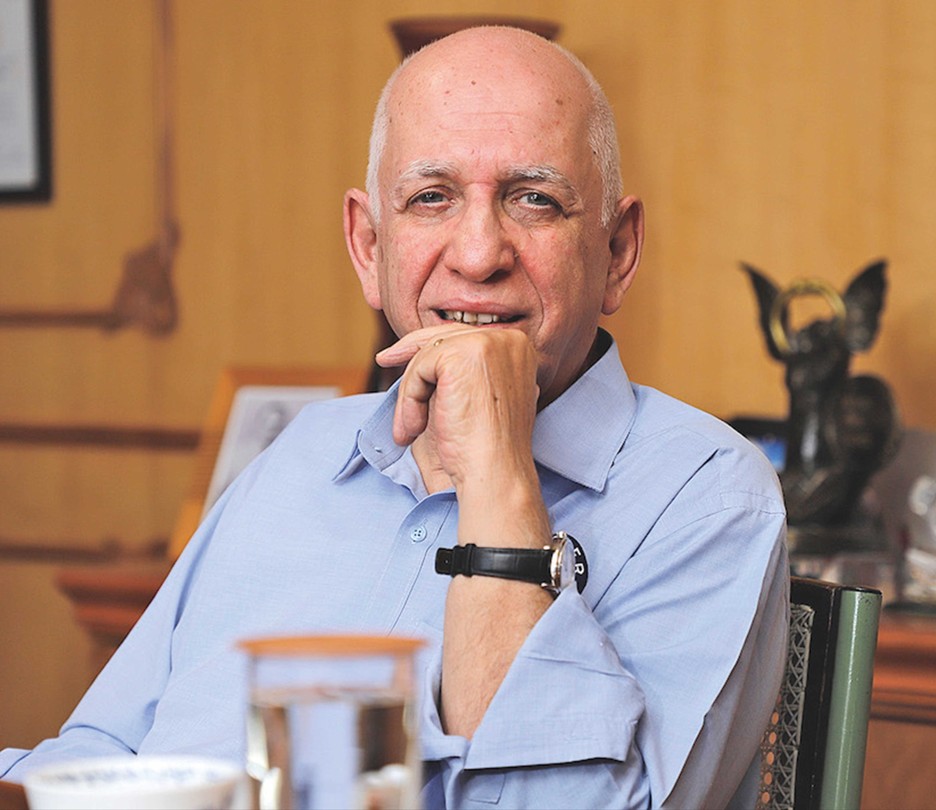
“The Union Budget 2025-26 is a good and forward-looking that supports economic growth while ensuring fairness for honest taxpayers. By introducing measures that simplify tax compliance and broaden the tax base, the government has made it easier for more individuals and businesses to contribute, ultimately fostering a culture of voluntary compliance. These reforms not only encourage transparency but also increase revenue generation, which will be channeled into nation-building initiatives, creating a more robust economic ecosystem.
This budget provides a significant boost to the manufacturing and MSME sectors, which are the backbone of India’s industrial growth. By enhancing credit availability, supporting domestic production, and prioritizing sustainable development, the government has reaffirmed its commitment to ‘Make in India’ and self-reliance. These initiatives will stimulate investments, generate employment, and accelerate economic expansion, positioning India as a global manufacturing powerhouse”.
Pricol Limited – Vikram Mohan, Managing Director

“The Union Budget 2025-26 lays a strong foundation for India’s automotive sector, emphasizing growth, innovation, and global competitiveness. For Pricol, reduced customs duties on electronic components could provide a boost considering our large electronics purchasing and consumption in our class of products. We see this budget as an enabler for transforming India into a key hub for high-value automotive electronics-oriented manufacturing.”
Raptee.HV – Dinesh Arjun, Co-founder & CEO

“Innovation and technology are the cornerstones of every developed nation, and India’s vision for Viksit Bharat rightly prioritizes these pillars. The Finance Minister’s focus on nurturing and investing in innovation is a commendable step toward accelerating new technologies that will shape our future. The allocation of a Deep Tech Fund will further strengthen India’s industrial ecosystem, fostering a globally competitive, tech-driven economy.
A crucial boost to the EV industry comes with the exemption of Li-Ion batteries and other capital goods, which will significantly reduce battery costs and encourage further investment in domestic battery manufacturing. Given that batteries make up 30-40% of an EV’s cost, this move will make EVs more affordable and accessible to consumers, driving mass adoption across two-wheelers, three-wheelers, and four-wheelers alike. By addressing a fundamental cost barrier, this initiative lays a strong foundation for the future of electric mobility in India. We are confident that these strategic measures will have a lasting positive impact on the EV ecosystem in the months to come.”
Battery Smart – Pulkit Khurana, CEO & Co-Founder
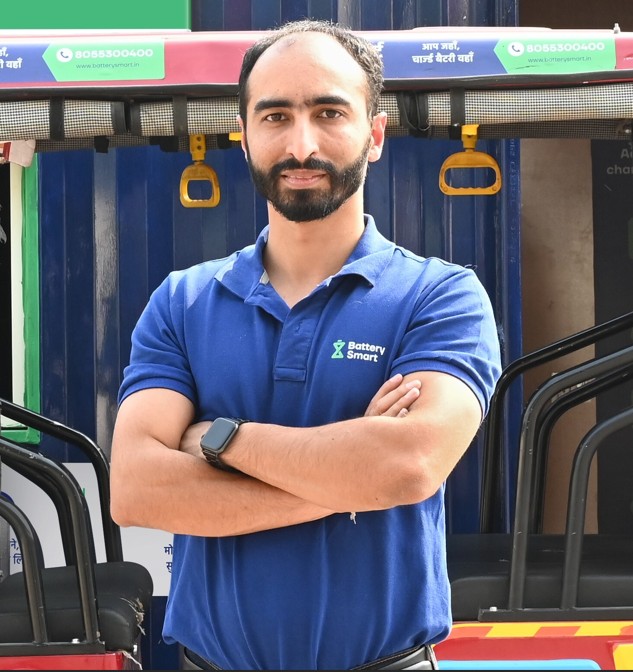
“The Union Budget 2025 brings positive momentum to the EV sector, reinforcing India’s commitment to clean mobility. The removal of basic customs duties on essential battery materials such as lithium, along with the inclusion of 35 more duty-free items for EV battery manufacturing, will lower production costs, making EVs more affordable for consumers. These measures will not only boost domestic manufacturing, reduce import dependence, but also significantly advance India’s clean energy goals.
Additionally, the introduction of a social security scheme for gig and platform workers is a vital step toward their formal recognition and financial security, contributing to a more inclusive economy. Together, these initiatives strengthen India’s position in green mobility, while fostering job creation and driving growth in emerging sustainable industries.”
Nippon Paint India – Sharad Malhotra, President, Automotive Refinishes & Wood Coatings

“The Union Budget 2025-26 has introduced several initiatives for strengthening India’s manufacturing sector and clean mobility. The ‘Make in India’ focus of the National Manufacturing Mission will boost local production, reduce import dependence, and strengthen supply chains, creating a more self-reliant economy. This initiative also emphasizes the importance of R&D to drive innovation and enhance manufacturing capabilities within India. At Nippon Paint India, we see this as a great opportunity to contribute to clean energy innovation and sustainable manufacturing. We’re committed to expanding local production, investing in advanced facilities, driving R&D efforts for next-generation products, and partnering with industry leaders to build a robust ecosystem for growth.”
BAXY Mobility – Naveeth Menon, VP – Sales & Marketing Operations

“The recent budget announcements have marked a significant step forward in India’s journey towards a cleaner and greener future. By eliminating the basic customs duty on critical materials required for electric vehicle manufacturing, the government has reinforced its commitment to faster EV adoption across the country.
The budget also introduced groundbreaking initiatives to accelerate the shift toward lithium-ion batteries in the EV sector. Tax exemptions for lithium-ion battery manufacturing are set to enhance local production capabilities, positioning India as a global hub for EV manufacturing .The move aligns with India’s broader goals of reducing carbon emissions and achieving energy independence.”
Khalsa E-Vehicles – Shivam Narang, Managing Director

“The Union Budget 2025 laid a strong foundation for India’s EV future. By fostering domestic manufacturing, easing battery costs, and promoting clean technology, the government has set the stage for long-term, sustainable growth. The focus on grid-scale batteries will help stabilise the renewable energy grid, ensuring that EVs can be powered by clean energy sources.
The exemption of basic customs duty on lithium-ion battery scrap is another commendable move. It promotes a circular economy by making battery recycling more viable, reducing reliance on fresh raw material imports, and decreasing production costs and environmental impact.
However, to ensure widespread EV adoption, further policy interventions around charging networks, financing models, and end-user incentives will be crucial. If these aspects are addressed in parallel, India has the potential to become a global leader in EV innovation and clean mobility solutions.”